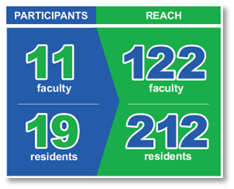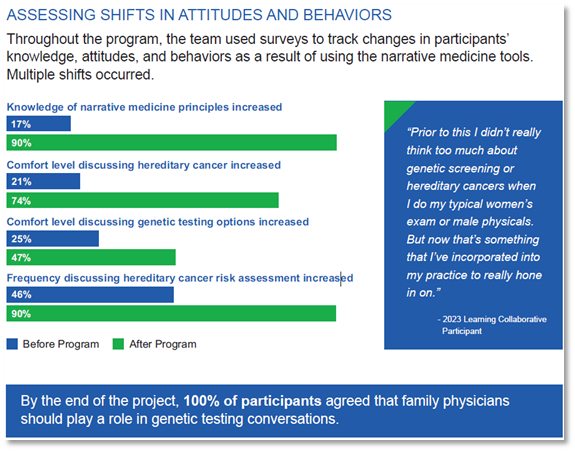Nine percent of breast and ovarian cancer diagnosis are found in women under 45. And those cases are more likely to be hereditary and to be found at a later stage, when the cancer is harder to treat. So, healthcare providers and educators need to get young women talking about hereditary cancer, understanding their risk, and being proactive about breast and ovarian health.
Family physicians are at the heart of early detection and prevention of cancer. They and their care teams are uniquely positioned to assess their patients’ family history, introduce the topic of genetic testing to those who are at risk, and help guide them toward the right resources. Yet according to CDC’s Division of Cancer Prevention and Control, only about 41% of primary care physicians refer women with a high risk for breast cancer for genetic counseling and testing.
To increase engagement with the family medicine community on this topic, the Family Medicine Education Consortium (FMEC) – in partnership with NACDD and with funding from CDC – created the 2023 Hereditary Cancer/Narrative Medicine Learning Collaborative.
Narrative medicine uses personal stories to overcome communication barriers between patients and healthcare providers. Stories are proven to make information more relatable and easier to understand. They help patients feel less alone and healthcare providers develop greater empathy. Members of the learning collaborative were asked to review the Bring Your Brave campaign storytelling tools and materials. These materials are designed to engage both patients and healthcare providers in more effective ways to talk about hereditary cancer, improve early detection, and reduce mortality.

Nine residency programs completed the Collaborative, including 11 faculty and 19 residents. Together, they reached an additional 122 faculty and 212 residents, who either learned from or provided feedback on the storytelling materials or benefited from the integration of the materials into their program once the learning portion of the project ended. In total, 550 faculty, residents, and community partners will become familiar with the Bring Your Brave resources in the next academic year.
Learning collaborative participants, faculty, and residents reported multiple shifts in knowledge, attitudes, and behaviors including: the knowledge of narrative medicine principles increased from 17% to 90%, comfort level discussing hereditary cancer increased from 21% to 74% and frequency discussing hereditary cancer risk assessment increased from 46% to 90%.

Perhaps most importantly, participants reported that Bring Your Brave resources would have a positive impact on patient outcomes.
- 95% said that having healthcare professionals review the Bring Your Brave resources will increase provider knowledge/comfort with the topic.
- 100% felt that reviewing the Bring Your Brave resources will provide insight into the patient experience and increase empathy.
100% of respondents said that reviewing the Bring Your Brave resources will have a positive impact on patient outcomes by observing and learning from the experiences of other physicians.
Take action today, learn more about the Bring Your Brave campaign.
